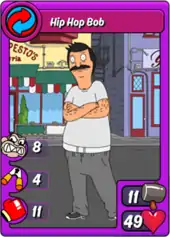Animation Throwdown: The Quest For Cards
Animation Throwdown: The Quest For Cards , also referred to as simply Animation Throwdown, is a free-to-play online collectible card game that combines content and characters from the American animated television shows Family Guy, Futurama, American Dad!, Bob's Burgers, and King of the Hill. The game is available for Android, iOS, Steam, Kartridge[1] and on the web via Kongregate;[2] all platforms share the same instance and players may use more than one platform to play the same account.
Turn-based gameplay consists of playing cards drawn from a virtual deck into the player's hand onto a tableau to fight against an AI playing cards from its own deck; depending on game mode the AI's deck may be system-generated or may belong to another player. Cards attack the card directly across from them and, if unopposed, attack the opponent's "hero" tower; the battle is won when the opponent's hero is defeated. A main tactic of card play is to play a character card and object card into the same slot to fuse into a more powerful combination ("combo") that the player has previously learned.[3] Cards are primarily images taken from one show, though some of the lowest-level cards are generic, such as "Alcohol", "Baseball", and "Music". Cards are played against a backdrop of a building or place from one of the shows.
New players begin the game with a low level starter hero, choosing one of Bob Belcher, Roger, Brian Griffin, Turanga Leela and Bobby Hill, and are provided with a collection of starter cards. Game play primarily focuses on earning resources to improve cards and obtain better cards, and to level up heroes and gain access to more powerful heroes; monetization primarily revolves around speeding up access to these improvements and providing access to premium content cards and heroes. Like MMORPGs there is no "win" condition; players who have completed all episodic content generally continue to upgrade their decks to remain competitive with each other. The game was rated Teen on Google Play and similarly on other platforms; the game contains some mature content such as drinking, infrequent drug use, cartoon violence, and sexual innuendos.
Gameplay
Play is divided between maintenance activities (acquiring cards, upgrading them, and assembling card decks from the player's collection) and playing battles against the game AI; there is no direct player interaction with opponents, or direct assistance of teammates.
Battle Format
Sample card:

Sample battle tableau:

Individual Play
New players are given a series of quests that guide them through learning game mechanics; as players advance, rotating quests, loyalty rewards, and challenges drive daily player engagement. In a typical challenge, players fight progressively higher-level opponents over a period of a few days, and receive an end payout based on their progress.
Team Play
Players can join teams ("guilds") of up to 50 players to improve their loot payouts and engage in competitions against other teams. Each guild has a private chat and forum. Team play modes involve players fighting a number of battles, within a set time frame, against the AI which is using a deck from a member of the opposing team. The substantial rewards for members of highly ranked guilds drive much of game revenue and engagement.
Reception
The game was received very well when it was first published, picked as an Editor's Choice on Google Play,[4] and reaching number 1 in the RPG and Adventure categories (and number 3 game overall) on the App Store,[5] but has gotten relatively little publicity since 2016. A 2020 review of the best CCGs on Steam noted that the category was dominated by the top two games, and mentioned Animation Throwdown's grindiness and heavy monetization as its drawbacks.[6]
- Overwhelming "pay-to-win" advantages
- Power creep
- Events that primarily reward "whales"
- Unreleased content made available exclusively to the highest-spending players [7][8]
- High rate of offer wall rejections after completing requirements
- Cheating scandals
- Drop rates not published for loot boxes or other random elements of the game; as of April 2019 the developers had been promising to release this information "soon" for 16 months.[9][10]
- Ease of making inadvertent gem purchases, especially of items of low perceived value such as Rare cards and easily obtained energy refills.
- AppGrooves - number 8 in their list of the top 10 CCGs; thousands of user ratings and comments [11]
- Common Sense Media - rated three stars for ages 14 or 15 and up only. Comments from both parents, and kids upset by the strong language and mature themes. Includes talking points for parents to discuss with their children.[12]
- TechCrunch - Discusses strategy and mechanics for beginning players, finding the game immersive and, at least temporarily, addictive.[13]
References
- "Animation Throwdown". www.kartridge.com. Retrieved 2020-10-25.
- "Animation Throwdown". Kongregate.
- "Game Review: Animation Throwdown: The Quest for Cards (Mobile – Free to Play)". Games, Brrraaains & A Head-Banging Life.
- "Kongregate surpasses 100 million mobile game downloads". VentureBeat.
- "Did I time travel or play Animation Throwdown for the entire day?". TechCrunch.
- "The Absolute Best CCGs to Play on Steam Right Now". GameSkinny.
- "A Timeline discussion on Kongregate". www.kongregate.com.
- "Negative Reviews: Animation Throwdown: The Collectible Card Game". AppGrooves.
- "Stealth nerf to adv drop chance? discussion on Kongregate". www.kongregate.com.
- "[Official] Quality of Life Suggestions & Game Requests 2019 discussion on Kongregate". www.kongregate.com.
- "Best 10 Magic Card Games". AppGrooves.
- "Animation Throwdown App review by Paul Semel". Common Sense Media.
- "Did I time travel or play Animation Throwdown for the entire day?". TechCrunch.